Altered States of Reading (Part 1): VALIS, Vallee, and Vaal
Where to begin when the story is a loop?
I have been mulling over a particularly rich and thought provoking entry from Jacques Vallee’s journals (Forbidden Science, Volume Two), about a synchronistic walk he took one day in October, 1973 with Hal Puthoff, head of the Stanford Research Institute program researching ESP. Vallee was telling his companion he thought the UFO problem and parapsychology were connected and that they were both more than scientific questions but also Hermetic quests or initiations, “an enigma like that of the Sphinx” … at which point, the two men turned a corner and found themselves face to face with a pair of sphinxes behind barbed wire. Vallee writes with amusement that “[Puthoff] must have thought I had known about the statues all along and had maneuvered him to the spot deliberately.”
We live in a vast precognitive soup, and at least some artists seem to draw not only from past influences but also from their own future timelines, precognizing their own books they have yet to write as well as books by others they have yet to read.
Vallee interprets such synchronicities as what he calls “intersigns,” connected to his notion of a higher multidimensional controlling agency—the idea he had been developing into his “control system” hypothesis. This hypothesis was the theme of his latest book manuscript, The Invisible College, which he had just finished drafting a couple months prior to this walk but which would not be published for over a year, in 1975. Vallee also makes the following comment, which is what made me do a double take: “I felt elated: Perhaps we were beginning to get the bigger picture. Shades of Philip Dick and VALIS! It’s not about extraterrestrials visiting our planet, I thought. It’s much bigger than that.”
This passage struck me as odd because of its timing. VALIS, the novel, did not come out until 1980, and even the mystical/paranormal experiences it was based on did not begin occurring to Dick until early 1974, a few months after Vallee’s walk with Puthoff. Moreover, the acronym VALIS (for “Vast Active Living Intelligence System”) did not emerge fully formed until after Dick’s most intense experiences; in his journals, Dick initially called the entity or extraterrestrial satellite beaming him information and commands “Zebra.” How then did a reference to VALIS get into a 1973 journal entry?
Although it is odd, I don’t think it’s too great a mystery, nor a case of precognition. Vallee also cited Dick’s “Vast Alive [sic] Living Intelligence System” as a literary version of his own postulated intelligent control system in the epilogue to the first volume of his journals, Forbidden Science, Volume One, covering the 1960s, although not published until the early 1990s. There, it is clear that the epilogue was written well in hindsight; in light of this, it seems that the October 1973 entry was thus probably also emended at some point much later, prior to being prepared for publication, and thus is not a case of actual literary prophecy. [Edit 9/8/15: Jacques Vallee let me know, via Patrick Huyghe of Anomalist Press, that the PKD comment was included erroneously when compiling his journals and notes for publication, and it has already been corrected in newer editions of the book.] But it spurred me to wonder about the uncanny resemblance of Vallee’s themes in Invisible College and the themes that Dick was struggling with in his life and fiction right during the period that Vallee was developing his control system concept.
 The similarity of Vallee’s most famous theory and Dick’s most famous literary creation are rather uncanny, if you think about it: Both postulate a higher, probably ancient intelligence somehow manipulating and controlling human society and evolution via select individuals receiving psychic communications and stage-managed “impossible” synchronicities. Once Vallee read Dick’s VALIS, it certainly made an impression on him—how could it not? Clearly a literary genius had independently arrived at some of the same ideas he himself had been developing, and the fiction writer had honestly asked the same questions he had; both writers avoided settling on a final answer as to who is actually behind this control system yet flirted with various possibilities ranging from all-too-human mind control to multidimensional beings. In other words, not only were the hypotheses similar, but so was the spirit of inquiry—skeptical, in the best sense. Given Dick’s long delay in publishing his closely autobiographical account of his 1974 experience, Vallee likely would not have known, unless he was totally steeped in Dick lore, that they had actually been attacking these problems practically simultaneously.
The similarity of Vallee’s most famous theory and Dick’s most famous literary creation are rather uncanny, if you think about it: Both postulate a higher, probably ancient intelligence somehow manipulating and controlling human society and evolution via select individuals receiving psychic communications and stage-managed “impossible” synchronicities. Once Vallee read Dick’s VALIS, it certainly made an impression on him—how could it not? Clearly a literary genius had independently arrived at some of the same ideas he himself had been developing, and the fiction writer had honestly asked the same questions he had; both writers avoided settling on a final answer as to who is actually behind this control system yet flirted with various possibilities ranging from all-too-human mind control to multidimensional beings. In other words, not only were the hypotheses similar, but so was the spirit of inquiry—skeptical, in the best sense. Given Dick’s long delay in publishing his closely autobiographical account of his 1974 experience, Vallee likely would not have known, unless he was totally steeped in Dick lore, that they had actually been attacking these problems practically simultaneously.
Were their ideas really independent?
A possible “source” we are forced to consider for Dick’s VALIS is of course Vallee himself. As early as 1974, in the aftermath of his 2-3-74 “Zebra” experiences, Dick began work on a novel that clearly had the germ of the idea, or name, of VALIS, but which he was then calling Valisystem A, and which would eventually become the posthumously published novel Radio Free Albemuth. Isn’t “Valisystem” an awful lot like Vallee System … as in Vallee Control System? Given the similarity of the two authors’ ideas, a connection between Dick’s idea and Vallee’s idea (and his name) seems likely to me; yet it is also, as near as I can tell, temporally “impossible.”
Vallee first drafted Invisible College in the span of two month in the summer of 1973, but he only finalized and edited it late the following year, to appear in 1975, months after Dick had begun referring in his journals and letters to a manuscript tentatively called Valisystem A. I have been unable to find the concept of a control system developed in any published work of Vallee that Dick could have read at that point; neither the phrase “control system” nor, really, the idea of such a system—at least in any developed form—appear in Vallee’s previous book, Passport to Magonia (although there is the possibility that Vallee may have mentioned such an idea in an interview or article—I invite readers who may know of something like that to let me know in comments).
There is also no indication in anything I have read on Dick, including Lawrence Sutin’s and Anthony Peake’s biographies, that he had had any contact with Vallee, although they would have overlapped in the Bay Area in the early 1970s, prior to Dick’s move south to Orange County in 1972. More tellingly, Vallee makes no mention of having ever met Dick—and it definitely seems like something he would have mentioned in his journals, given that his journals are a parade of other interesting writers and counterculture figures from that time and place. Dick never mentions reading any Vallee later on either, although this doesn’t say much, as Dick read widely (and absorbed ideas through many channels) and didn’t always leave any record of what he was reading. (Again, if any readers know differently, please let me know!)
Given Dick’s reputation for precognition, I think the coincidence of two control systems, being theorized and developed contemporaneously, so similar in name, suggests a possible psi-literary correspondence.
A Map of Precognitive Misreading
The obvious psi channel to consider would be telepathy, but for various reasons I am increasingly convinced that the main, or possibly only, true psi channel—even when it seems like mind-to-mind contact—is precognition. When we seem in touch with another person across space, there is no way to rule out that we are not actually precognizing the future moment (whether imminent or more distant) when the “true connection” is revealed or confirmed. If psi is based on a kind of “morphic resonance” of quantum brain states, it seems far more likely or common for our own brain states to resonate across time than for two different brains to resonate with each other, even if the latter is theoretically possible. In other words, telepathic connection may be miscrecognized precognition of a future real-world connection.
Among literary types, precognition seems to uniquely characterize frenetic genre writers, people compelled to bust their asses in the “trash stratum” just to make ends meet.
Dick has been called prophetic, like many other sci-fi writers. But he has also been called precognitive, as so many of his stories and personal experiences suggest genuine psi sensitivity. Besides the uncanny precognitive events in his personal life in the aftermath of his 2-3-74 experience, such as correctly divining the presence of a life-threatening inguinal hernia in his infant son while listening to the Beatles’ “Strawberry Fields,” Dick uncannily precognized numerous developments in our culture. My favorite of his novels, The Three Stigmata of Palmer Eldritch, not only seems prophetic of later revelations about use of hallucinogens in mind control experiments but also was uncannily prescient about the symbiotic integration of drugs and popular culture that would flower with the rave/trance scene in the 90s. William Sarill suggests that with Ubik—Dick’s second most famous literary invention—he may have precognized the wonder supplement Ubiquinone (now better known now as Coenzyme Q-10).
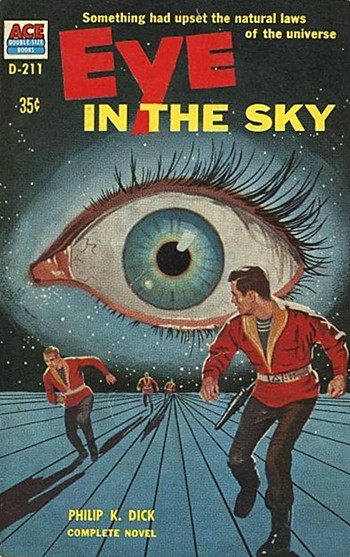 In his A Life of Philip K Dick: The Man Who Remembered the Future
In his A Life of Philip K Dick: The Man Who Remembered the Future, Peake lists numerous other cases in which Dick seems to have precognized events in his own life. Although some of these cases can certainly be explained as the writer unconsciously fulfilling his own myth after the fact, others are uncanny and highly suggestive of something paranormal. I absolutely agree with Peake that Dick had been precognizing his own future his whole life, possibly even visiting his past self in dreams. Dick saw it this way too, and his Exegesis
is a massive investigation of the implications of such autobiographical time loops for our understanding of causality and consciousness, one of the most mind-blowing books of our time.
That Dick was channeling his own future, particularly when he was absorbed in frenetically setting words to page, should not surprise us at all. Psi seems to emerge especially in “flow” states of skilled engagement. Whenever you are really cooking at whatever it is you are most skilled at and enjoy, that’s when (albeit unbenownst to you) you will be most tapped into the precognitive signal channel I have called “prophetic jouissance” and which traditionally has just been called “the muse.” Among literary types, precognition seems to uniquely characterize frenetic genre writers, people compelled to bust their asses in the “trash stratum” just to make ends meet.
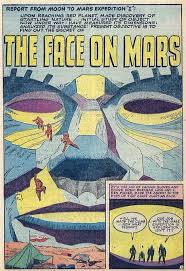 Dick is only the most famous example. The alcoholic, depressed, and impoverished sea adventure writer Morgan Robertson precognized not only the sinking of the Titanic 14 years before it occurred but also the Japanese sneak attack on the U.S. Navy in Hawaii and the invention of radar. Comics genius Jack Kirby, as Chris Knowles has described on his blog, saw and described the “face on mars” 17 years before it was photographed by the Viking orbiters. Knowles has found other similar cases in Kirby’s works.
Dick is only the most famous example. The alcoholic, depressed, and impoverished sea adventure writer Morgan Robertson precognized not only the sinking of the Titanic 14 years before it occurred but also the Japanese sneak attack on the U.S. Navy in Hawaii and the invention of radar. Comics genius Jack Kirby, as Chris Knowles has described on his blog, saw and described the “face on mars” 17 years before it was photographed by the Viking orbiters. Knowles has found other similar cases in Kirby’s works.
It seems (as Knowles suggests) that the less self-conscious of being “respectably literary” a writer or artist is, and the faster he produces, the more uncanny prophecies emerge “automatically” from his pen or typewriter. Inspiration, I am convinced, is real, authentic psi. Although Rick Strassman has linked prophecy to DMT and the pineal gland (the usual ‘unitarian’ wishful thinking that goes back to Descartes and possibly the ancient world), I foretell that a future neuropsychology of psi will concentrate on dopamine and the dopaminergic circuits of the reward system, since dopamine is really the neurotransmitter most associated with anticipatory signals. Appropriately enough in Dick’s case and probably lots of other under-the-gun genre writers, it is stimulants like amphetamines and even coffee that most directly boost dopamine and thus frenetic anticipatory jouissance, not hallucinogens.
We live in a vast precognitive soup, and at least some artists seem to draw not only from past influences but also from their own future timelines, precognizing their own books they have yet to write as well as books by others they have yet to read. Dick’s hypnagogic visions in 1974 notably included many unread or nonexistent books and galley proofs of what could have been his own future books or books by others in progress. A future “map of precognitive misreading” should thus extend Harold Bloom’s critical theory (The Anxiety of Influence) and explore the role of psi in literary/artistic and even scientific creation. It would require, partly, a better-developed theory of precognition in creative and social networks: Ideas may diffuse among contemporaries precognitively, through future sharings and convergences. In other words, people who have never met (yet) may share ideas, not via telepathy, but by precognizing their future interactions in the flesh or, more likely, the future encountering of their exciting ideas in print. Artists may be reading each other precognitively and borrowing each others most creative ideas, and preempting them, via a vast unconscious psi internet that only a few (including Knowles) have begun to explore.
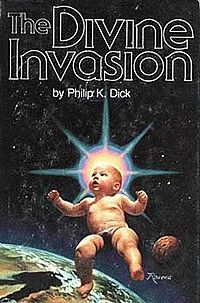 Coming to my main point … I certainly can’t prove it, but I do suspect that in 1974 Dick either precognized reading The Invisible College or precognized reading about Vallee’s control system idea in some secondary source, or hearing about it from a friend, and mapped it onto his own evolving Gnostic suspicions about the world. This would mean that VALIS might actually be named after Vallee, and thus when Vallee later found and admired Dick’s work, it was like being drawn to a bastard child he did not know he’d fathered.
Coming to my main point … I certainly can’t prove it, but I do suspect that in 1974 Dick either precognized reading The Invisible College or precognized reading about Vallee’s control system idea in some secondary source, or hearing about it from a friend, and mapped it onto his own evolving Gnostic suspicions about the world. This would mean that VALIS might actually be named after Vallee, and thus when Vallee later found and admired Dick’s work, it was like being drawn to a bastard child he did not know he’d fathered.
But there’s more to this (yes, highly speculative) story.
From VALIS to Vaal
Rewind several years, to 1967.
I wrote a few months ago about a precognitive dream I had related to a 1967 Star Trek episode called “The Apple,” about an ancient planetary computer named Vaal, which keeps the primitive humanoids who feed and service it in a state of ignorance and innocence. “The Apple” was typical of many Star Trek episodes that had a Gnostic theme: Some computer or other controlling demigod always seemed to be keeping the locals in a state of ignorance or slavery until the Enterprise crew arrived and liberated them. In fact, Max Simon Ehrlich’s original screenplay for “The Apple” was seen as so unoriginal and so specifically similar to the episode “Return of the Archons,” also about a computer ideologically regulating a planet’s inhabitants, that Gene L. Coon subjected it to a major revision to make it more distinct.
Artistic/creative feedback loops could be an important way that occulted, occluded, disbelieved, or misidentified precognition shapes human culture, and thus a future literary criticism will involve a kind of psychic deconstruction.
In the episode, Vaal (who appears as a big reptilian stone head) communicates to his elect, the leader of the humanoids named Akuta, via transmissions beamed to small antennae implanted behind his ears—in other words, Vaal is a vast, active, and even “living” (since he seems to require periodic offerings of fruit as fuel), intelligent control system, who exerts his influence by manipulating the thoughts and beliefs of the planet’s “innocent” inhabitants.
Dick was like a sponge soaking up pop culture, and no stranger to cryptomnesia. Paul Rydeen notes likely influences in VALIS of Scientology, of Robert Temple’s The Sirius Mystery (which seems to have deflected the origins of Valis from Formalhaut, in Radio Free Albemuth, to Sirius in VALIS), and the Star Trek episode “Break and Circuses.” The latter, about a basically 20th-century planet where Rome never fell, seems like it could have wormed its way into Dick’s ancient Rome visions/experiences (although ironically, this and many Star Trek alternative history episodes were no doubt influenced in turn by Dick’s own Man in the High Castle). It is entirely possible that Dick could have also seen “The Apple,” either when it first aired or, as I did, in endless weekday afternoon reruns during the mid-1970s, and been subconsciously influenced by it, morphing his own paranoid/Gnostic theory of a higher planetary control system into VALIS.
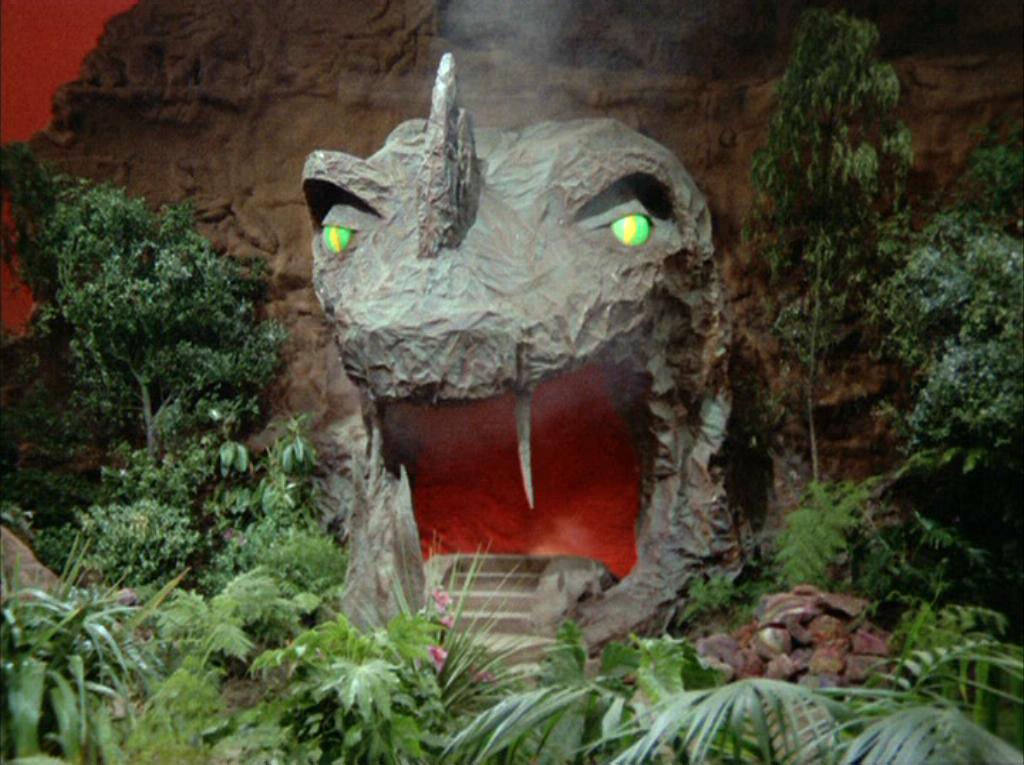 This would seemingly negate my earlier psi-based argument, of course: If the name of Dick’s control system came from anywhere in the linear flow of time, it would have come from Ehrlich’s Vaal, not from a still-fairly-obscure UFO researcher who had yet to publish his control system theory. But I propose that, in our precognitive world, and for someone like Dick, the reverse is just as easily the case. Apart from the simple fact that Vallee himself preexisted Ehrlich’s screenplay and Dick’s 1970s writing, linguistics itself supports the priority of naming in this precognitive synchronisitic clusterfuck: “Valis” is a good guess of how an American like Dick might spell a presumptively French word that sounds the way “Vallee” is spelled—for instance, if he heard the name pronounced by an English speaker (with a long e at the end) in a context suggesting the name was French, such as paired with the name Jacques. One could easily imagine that the phrase “Vallee control system” was among the hypnagogic phrases that Dick received from the psychic aether (or, perhaps, from whatever mind control experiment was beaming information into his brain in 1974*).
This would seemingly negate my earlier psi-based argument, of course: If the name of Dick’s control system came from anywhere in the linear flow of time, it would have come from Ehrlich’s Vaal, not from a still-fairly-obscure UFO researcher who had yet to publish his control system theory. But I propose that, in our precognitive world, and for someone like Dick, the reverse is just as easily the case. Apart from the simple fact that Vallee himself preexisted Ehrlich’s screenplay and Dick’s 1970s writing, linguistics itself supports the priority of naming in this precognitive synchronisitic clusterfuck: “Valis” is a good guess of how an American like Dick might spell a presumptively French word that sounds the way “Vallee” is spelled—for instance, if he heard the name pronounced by an English speaker (with a long e at the end) in a context suggesting the name was French, such as paired with the name Jacques. One could easily imagine that the phrase “Vallee control system” was among the hypnagogic phrases that Dick received from the psychic aether (or, perhaps, from whatever mind control experiment was beaming information into his brain in 1974*).
Thus, the more likely direction of influence is from Vallee to Dick. Consequently, Ehrlich is more likely to have gotten the name Vaal precognitively from VALIS than vice versa!
Plagiarizing From the Future
I have written about Slavoj Žižek’s “time loop” interpretation of Jacques Lacan’s theory of the symptom. Žižek is careful to distance himself from actual paranormal phenomena like precognition or time travel, yet his own constant citing of Gnostic science fiction indicates his secret love of such possibilities, so his protests seem to me like anxious defenses to prop up a beleaguered post-Marxian materialism. In a very interesting essay, he delves into the possibility he calls (following Pierre Bayard), “plagiarizing from the future.” The sure indicator that a previous work has plagiarized from a later one, he says, is when the particular, presumptively borrowed element in the earlier work is either jarringly out of place or simply not well developed, compared to the later work.
When the earlier manifestation of an idea is not only less well developed or out of place but also in a “lower” form of literature or writing, it is liable to have been unconsciously inspired by the later work, a case of precognitive plagiarism.
We could add to the list of tip-offs the basic idea that plagiarism from the future, like other forms of plagiarism, both is nearly always unconscious (or at best misrecognized, as no one, not even artists, with the sole exception of Dick, believes in precognition) and, more importantly, tends to be by “lower-status” artists—that is, writers who are forced by lack of public appreciation (Dick), lack of literary gifts (Robertson), or merely their career circumstances (Kirby, Ehrlich) to work hard in a medium that does not have a lot of artistic respectability. Thus, when the earlier manifestation of an idea is not only less well developed or out of place but also in a “lower” form of literature or writing, it is liable to have been unconsciously inspired by the later work, a case of precognitive plagiarism.
I think few would dispute the relative merits of Max Ehrlich’s “The Apple” and Dick’s VALIS—one is a derivative piece of TV camp that, as Marc Cushman puts it, feels like the Enterprise has taken a trip to Gilligan’s Island, while VALIS is arguably one of the best and most interesting novels of the 20th century—even if the cruel genre gods still relegated it to the second-class category of “science fiction.” It is certainly an honest novel, confronting the author’s true (even if psychotic) experiences in an authentic way. Thus, I think it is likely that Ehrlich precognized and borrowed the idea for VALIS in 1966, calling it Vaal, not knowing what he was doing, and especially having no inkling that his planetary stone-headed god was, by a double remove, named after the young UFO researcher Jacques Vallee, whom he had probably never even heard of.
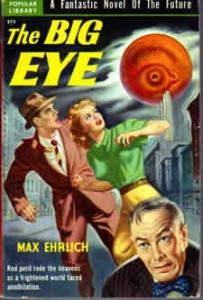 Why do I think this? Because Ehrlich himself shows signs of being one of those precognitive writers toiling in the disregarded cultural slums, who possibly even had a past history of precognitively plagiarizing Dick’s ideas (or at least, book covers). One of Ehrlich’s early novels, for example, The Big Eye (1950), is about the cessation of the Cold War because of the imminent destruction of Earth in a planetary collision, which turns out to be an astronomer’s hoax; the motif of an eye-like image looming in the sky prefigures Dick’s McCarthyism-themed 1958 novel Eye in the Sky, and I can’t help but wonder if somehow the cover (at least) of Dick’s novel may have influenced Ehrlich. There are other possible connections, which I will delve into in a separate post.
Why do I think this? Because Ehrlich himself shows signs of being one of those precognitive writers toiling in the disregarded cultural slums, who possibly even had a past history of precognitively plagiarizing Dick’s ideas (or at least, book covers). One of Ehrlich’s early novels, for example, The Big Eye (1950), is about the cessation of the Cold War because of the imminent destruction of Earth in a planetary collision, which turns out to be an astronomer’s hoax; the motif of an eye-like image looming in the sky prefigures Dick’s McCarthyism-themed 1958 novel Eye in the Sky, and I can’t help but wonder if somehow the cover (at least) of Dick’s novel may have influenced Ehrlich. There are other possible connections, which I will delve into in a separate post.
Psychic Deconstruction
Of course, even if Ehrlich “read” Dick avant a lettre and “plagiarized” from him, it does not preclude Dick also seeing Ehrlich’s Star Trek episode and being influenced by it in turn, in the usual way. This would produce a sort of idea-feedback loop not unlike what I have theorized accounts for synchronicities within the life of an individual. One feature of precognition I have noticed in my own modest investigations into the phenomenon is that some kind of minor coincidence or doubling creates the initial spark, or forms an associative short circuit, acting as the nucleus of the symptom formation that is creative prophetic inspiration. It is completely conceivable to me that seeing a rerun of the Star Trek episode, by closely matching Dick’s own Gnostic ideas and experiences, could have catalyzed a precognitive encounter with Vallee’s ideas and thus given birth to Valisystem and VALIS, just as much as VALIS helped retrocausally shape Ehrlich’s teleplay.
What Vallee and Dick were both trying to put their fingers on could be nothing other than alienated psi, our own prophetic natures disbelieved, disavowed, and thus projected onto some imagined alien technology or intelligence.
I think this kind of artistic/creative feedback loop could be an important (as yet totally unexplored) way that occulted, occluded, disbelieved, or misidentified precognition shapes human culture, and thus a future literary criticism will involve a kind of psychic deconstruction. I am also not too modest to think that this logic, the totally unconscious machinations of precognition in our lives and relationships and the way they produce feedback effects because of our ideologically blinkered nonawareness of psi, may also give rise exactly to the illusion of a homeostatic control system being operated by a higher intelligence. It’s not an illusion, exactly—such an atemporal feedback effect would really be a thermostat regulating our lives, producing chaos and tricksterish effects when we are out of sync with our enjoyment, or the Tao, or whatever you want to call it, and harmonic synchronicities when we are better resonating with our future rewards. The only thing actually missing is the “Other” who is presumed to be manning (or womaning) the controls. The Other is us, unrecognized.
In other words, what Vallee and Dick were both trying to put their fingers on could be nothing other than alienated psi, our own prophetic natures disbelieved, disavowed, and thus projected onto some imagined alien technology or intelligence. If psi includes psychokinetic effects as well as precognitive effects, as abundant research also affirms, then we should take the trickster seriously here: Because no one believes in psi (even most psi believers pay lip service but don’t actually think too hard about the implications), not only our psi radar but also our intentions run rampant in the world, causing effects that no one understands and that we desperately try to fit into a causal narrative. Eric Ouellet’s excellent new book, Illuminations: The UFO Experience as a Parapsychological Event, describes how UFO waves can potentially be explained as mass poltergeist (or recurrent spontaneous psychokinesis) phenomena, along similar lines.
The sure sign of a science in denial of psi is that it runs in circles, perpetually elaborating and becoming more involuted without actually converging on final answers to its driving questions. Isn’t this what is happening both to physics and psychology? The breakthrough will happen, if it happens, only when psi is acknowledged.
Time Is the Problem
Which raises the further question, in light of Vallee’s core interest in UFOs: We tend to think in terms of “missing time,” but maybe displaced time is better. The “precognitive, sentient” nature of such phenomena has been noted by John Alexander and others. But who is it who is precognitive? Are they precognitive, or do they somehow cause us to be precognitive … and does the tricksterish nature of the phenomenon arise partly from our own dogged determination to see causality as unidirectional? UFO encounters are often surrounded by synchronicities, but I have suggested that synchronicities are really ‘surprises’ produced by our own unacknowledged precognitive faculty. We predict or orient to something precognitively but then, because we don’t believe in precognition, feel shock and surprise when the thing we precognitively oriented toward manifests in our life.
Oedipus isn’t really about marrying your mother; it is an archetype of misrecognized psi—how we wreak havoc on our lives and relationships when we engage in time travel and don’t know it.
In The Invisible College, Vallee signals loudly that time is the problem, that effects might come before causes, and that UFOs seem to be trying to convey something of this nature. He mentions a French 1954 encounter in which a UFO occupant asked a witness what time it was; the witness replied “2:30,” to which the UFO visitor answered, “You lie—it is four o’clock.” Time displacement is a common feature of close encounters. A recent MUFON case file described a pilot encounter with a UFO closely shadowing his plane, which was caught on radar … but with an eight-minute time displacement from the pilot’s actual spacetime position.
So here’s another possibility to ponder: When people see UFOs, are they actually seeing things not from the future but in the future, the business end of psychic (or psychotronic) time machines or psychic projectors being operated by our descendents? Could UFOs be visions of a future technology designed precisely to establish a psychic link, or collect psychic information, across time as well as space? Do UFOs represent future technological interventions to alter “past” history, sort of like massively scaled-up versions of Helmut Schmidt’s retro-PK experiments?
Squinting hard and rubbing my temples, my prophecy of the future of ufology is that the answer is indeed going to come from parapsychology, just as Vallee intuited and as Eric Ouellet reminds us. I’m not sure I totally buy Ouellet’s poltergeist idea, but in the over four decades since Vallee took his walk with Puthoff, there have not been many other big advances. Perhaps we will not have confirmation of what UFOs are until psychotronic technology is developed—that is, until the present generation is the agent of psychic technology and not on the receiving end. This is the true meaning, perhaps, of the claims of some bitter aging ufologists that we will not see an answer to the UFO question in our lifetimes. If it’s true, it’s simply because it’s not the future yet.
Postscript: Is Vallee VALIS?
Inserting reference to a particular event in a text that ostensibly precedes the event is one way of creating the illusion of prophecy. That is the oldest trick in the forgers book: You can manipulate belief very easily by playing with the apparent dates of things, and who knew what when. The most famous example of this is the Hermetic corpus, which was probably written in the first few centuries CE and included oblique references to Christ. For Renaissance intellectuals, who believed it preceded the Common Era, this confirmed its prophetic nature; another possibility is that it was genuinely older but was later emended with suggestive references to the savior to give it “prophetic” authority.
In the 1973 diary entry I mentioned, Vallee smuggles in a reference to Dick’s VALIS months before Dick even had his ‘mystical’ experience or began writing about VALIS in his own journals. Like I said, the context, and the fact we know he did go back and edit or at least comment on his journals, suggests this was not precognition on Vallee’s part but a much later editorial emendation that simply did not take into account the precise publication date of Dick’s VALIS or the work leading up to it. It could be totally innocent. But could Vallee also have been engaging in the same kind of trickery he attributes to the control system?
In Invisible College, Vallee mentions time displacement in the context of hypnotic manipulation, relating a vignette in which psychologist Milton Erickson found he could render a subject susceptible to suggestion through reframing. The example Erickson uses is politely telling a person he has just collided with on the street the (wrong) time of day, instead of a humble apology, leaving the other person desperately ready to embrace any new piece of concrete information to alleviate their confusion. UFOs, Vallee suggests, are a bit like that collision and bizarre reframing, making the witness very susceptible to some kind of hypnotic manipulation. In a Radio Mysterioso interview, the late Bruce Duensing suggests Vallee is playing such a game by noting the strangely non-sequitur mention of UFOs in the middle of Vallee’s Ted talk “The Age of Impossible: Anticipating Discontinuous Futures.”
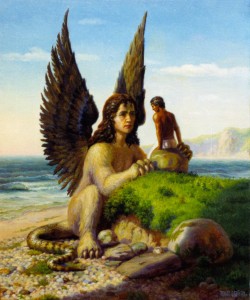 That Vallee’s journal insertion of VALIS occurs in a very suggestive context of sphinxes and initiations makes me think Duensing could be right, and that Vallee may be playing the trickster here and elsewhere in his works. Vallee himself is a Hermeticist, and elsewhere in Hermetic literature, sphinxes appear as a signal that you need to take the given elements and think about their real sequence to arrive at the true meaning.** In my post on “time’s taboos,” I mentioned the sphinx as a symbol of time travel, and this is what I meant: Not literally creating a wormhole or time machine, but changing the perceived order of events, or seeing how what seems to be an effect may be a cause, and vice versa: exactly the kind of PhilDickian “disordered” thinking necessary to seriously contemplate precognition and its implications.
That Vallee’s journal insertion of VALIS occurs in a very suggestive context of sphinxes and initiations makes me think Duensing could be right, and that Vallee may be playing the trickster here and elsewhere in his works. Vallee himself is a Hermeticist, and elsewhere in Hermetic literature, sphinxes appear as a signal that you need to take the given elements and think about their real sequence to arrive at the true meaning.** In my post on “time’s taboos,” I mentioned the sphinx as a symbol of time travel, and this is what I meant: Not literally creating a wormhole or time machine, but changing the perceived order of events, or seeing how what seems to be an effect may be a cause, and vice versa: exactly the kind of PhilDickian “disordered” thinking necessary to seriously contemplate precognition and its implications.
This is the latent meaning of the sphinx’s riddle in the Oedipus myth: The numerical sequence 423(1) (“What animal walks on four feet in the morning, two in the afternoon, and three in the evening?” and answered correctly by Oedipus, who limps on only one good foot) is clearly out of order. The human story really begins, not ends, with Oedipus. Freud of course saw that clearly, but Oedipus isn’t really about marrying your mother … It is an archetype of misrecognized psi—how we wreak havoc on our lives and relationships when we engage in time travel and don’t know it.
Vallee is keying in on precisely the power of UFOs to get us to re-think the order in which things occur—in other words, consider the possibilities created/demanded by the real existence of psi. I thus think he himself is trying, in his writings, in his own humble way (and to his small but devoted audience), to be a UFO.
NOTES
*The explosion of interest in psychic contact with alien intelligences in the 1970s, especially in California, coincided with suspected CIA experimentation in mind control, and the suspicion of worldly forces screwing with vulnerable and brilliant minds of the period overshadows much of this material, including Dick’s writings. Zebra/VALIS bears strong resemblance to Andrija Puharich’s “Spectra,” for instance, and the latter’s possible connection to CIA mind control research has raised speculation (by Adam Gorightly and others) that Dick himself was an unwitting victim of such experiments. There is certainly much in Dick’s life story that is suggestive, such as his and his wife’s discovery that the neighboring apartment was vacant except for a lot of electronic equipment. I have even read speculation—although I don’t believe it—that the SRI remote viewing research itself was a cover for mind-control experiments. It is very hard to know what to make of the mind control angle, and even delving superficially into the topic leads to a murky (potentially sanity-destroying) quagmire of paranoia. I thus leave this topic to others who better have their fingers on the pulse of this nexus of pop culture, fringe science, and conspiracy theory (Chris Knowles, that means you).
**Alert readers of Fulcanelli’s Cathedrals book may note something similar going on with that text, and the sphinxes therein. The alchemical secret, if Fulcanelli is to be believed, centers not on the End Times, as Jay Weidner and Vincent Bridges argue in their massive exercise in exegetical pareidolia, The Mysteries of the Great Cross of Hendaye, but on the end of time, as in, stopping or stepping out of time. Apocalypticism, as expressed in End Time cults and Christian Fundamentalism, represents, as Fulcanelli deliberately phrases it, primitive chiliasm (milennarianism)—primitive as in overly concrete or “literal minded.” In other words, supposing any of this has to do with the End Times is to naively fall for his trap. Fulcanelli’s interest is really in stopping or suspending time itself.
How do we do that? Duh, meditation. This is clear enough because Rene Schwaller, who may have been Fulcanelli (all you need to do is adjust Fulcanelli’s supposed chronology) or who at least, by his own claim, gave Fulcanelli the manuscript that became the Cathedrals book, tells us, via Andre Vandenbroek, that “stopping time” is the aim of alchemy. The point is “cognition of the present moment … the Absolute from which we draw our power.” Colin Wilson explains this as the most significant feature of Schwaller’s Hermetic philosophy:
One way of explaining it would be to say that human beings imagine they live in the present, yet their basic mental state might be described as ‘elsewhereness’, like a schoolboy looking out of a window instead of paying attention to the lesson. It is, in fact, incredibly difficult to be ‘present’, since we live in an interpreted world. We cannot even ‘see’ without preconception—’that is so and so’. Our most basic frame of mind is that of spectators; we look out at the world like someone in a cinema. When a man awakens to present reality—as Dostoevsky did when stood in front of a firing squad—the whole world changes. Everything suddenly becomes real. But his vision of himself also changes: he becomes aware of himself as a dynamic force rather than as a passive entity. … [A]lchemy, or the transmutation of matter into spirit … depends upon this ‘moment of power’, of being wholly present in the present moment.

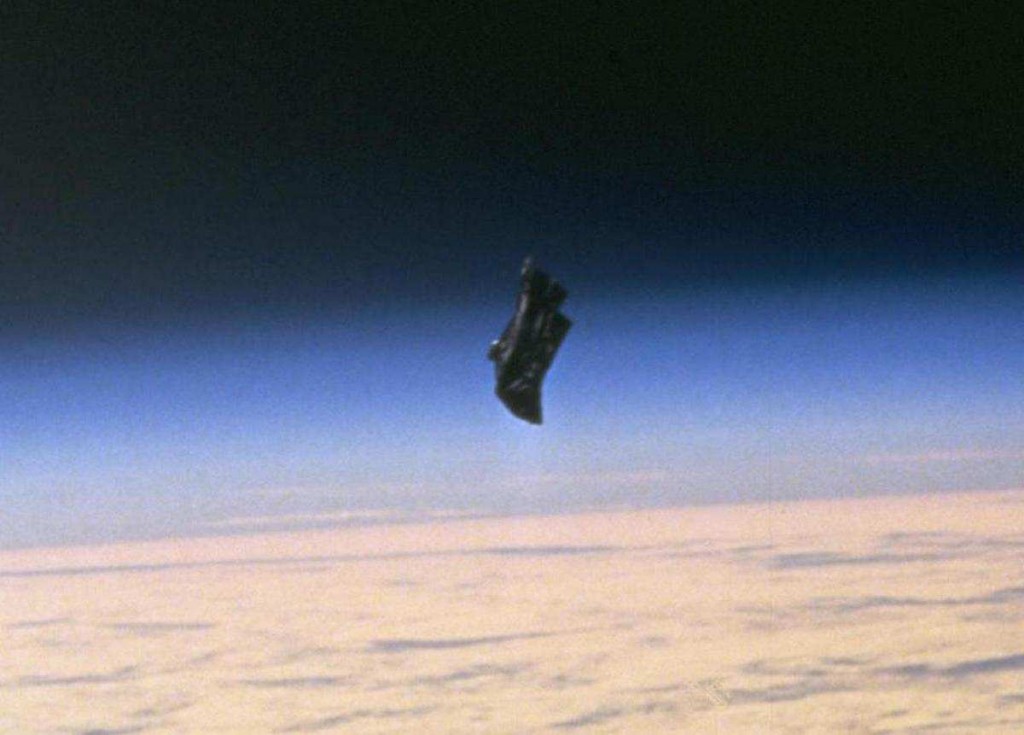


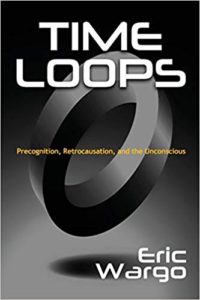

This is splendid.
And I’m with you on the telepathy thing. Parsimony alone suggests we should posit precognitiion -which covers the overwhelming majority of effects observed- as the ‘main’ unacknowledged ‘consciousness effect’ associated with the paranormal… if only to see how well the hypothesis fits.
Pete Carroll wrote a rather famous essay that includes how this relates to divination:
http://www.specularium.org/wizardry/item/114-magical-theory
This hypothesis would align with the observation that remote viewers achieve improved accuracy in sessions where they are eventually provided with feedback.